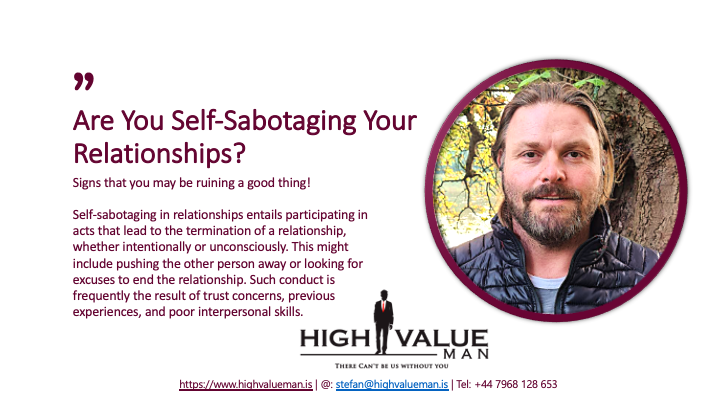You meet someone new and enjoy dating for a short time. The connection is fantastic, there is chemistry, and sex is enjoyable. You begin to spend more and more time together and explore becoming a pair.
But then you stop responding to their texts. You change your plans constantly. You avoid discussing taking things to the next level. Your partner feels frustrated, disappointed, or even angry because of your actions. Soon after, the partner ends the relationship.
Is this anything that has happened to you? If this is the case, you may be sabotaging your relationships.
Why do I sabotage myself in relationships?
The reasons why someone may destroy their own relationships vary depending on the situation. Everyone has a unique history: how we were raised, our childhood, adolescence, and our first meaningful relationships all impact how we act today.
Fear of closeness is the main reason why individuals destroy their relationships. When people fear emotional or physical connection with others, they are terrified of intimacy.
Everyone desires and requires closeness. However, for other people, closeness may be associated with unpleasant rather than positive experiences, resulting in "push-and-pull" behaviour that results in a relationship breakdown or avoidance.
Childhood Abuse
Often, fear of intimacy stems from poor or violent parental relationships and early trauma (physical, sexual, or emotional). Those who dread intimacy have a strong, ingrained notion that "people close to me cannot be trusted."
People who dread intimacy feel that because their early trusting relationships with their parents or caregivers were shattered by abuse, those who love them would surely hurt them. They could not get out of these relationships as children, but as adults, they have the power to terminate or leave them, even if they are not harmful.
Fears
This anxiety manifests itself in two forms: fear of abandonment and fear of engulfment. First, individuals are concerned that others they care about may abandon them when they are at their most vulnerable.
Second, people are concerned about losing their identity or capacity to make their own judgments. These two anxieties frequently coexist, resulting in the "push-and-pull" behaviour typical of persons with significant phobias of intimacy.
Reasons for Relationship Self-Sabotage
Some of the most common motivations for self-sabotage in relationships are:
- The fear of being injured or abandoned
- Trust concerns that are frequently connected to prior traumatic events
- Expectations that are very high, if not unreasonable
- Inadequate self-esteem
- a lack of interpersonal skills
Relationship Self-Sabotage Signs
There are several indicators that you may have a tendency to destroy even the finest of relationships. Here are a few examples of the most prevalent.
Searching for an Exit
You avoid anything that may lead to a more significant commitment, such as meeting parents or moving in together. You're continually thinking, "If something goes wrong, how can I quickly get out of this relationship?"
You reject commitment because it limits your capacity to quit a relationship without financial or emotional penalties.
You may begin to withdraw from the connection or grow distant. You may sometimes start to avoid spending time with the other person.
Gaslighting
Gaslighting is a type of emotional abuse in which the perpetrator denies the other person's reality or experiences. For example, suppose your spouse says: "I'm extremely disappointed that you cancelled our date," you answer, "You're not truly upset. It's your fault I cancelled, and you're simply blaming me for it."
Gaslighting indicates that you do not honestly believe your partner's emotions are authentic (even though they are).
Serial Dating
Your friends frequently question why you break up with potential companions so often or bemoan the fact that you never seem to settle down with anybody. You break up with partners over trivial concerns just to start dating someone else immediately afterwards and resume the pattern. You don't want to be perceived as a "player," yet you can't seem to find anybody to commit to.
Jealousy
You're always concerned that your lover is seeing someone else behind your back. You expect complete control over their lives and regular interaction. When they spend time with other people without you, you worry, text frequently, feel envious, and demand confirmation that they are faithful. They end their relationship with you because they perceive you to be dominating.
Criticism
You are continuously looking for perfection in a spouse, although knowing that it is unachievable. You criticise everything they do, from how they cook to their clothing. You are hard to please, and your spouse finally gives up and ends the relationship.
Avoidance
You spend a lot of time convincing yourself that the relationship is perfect, even when it isn't. When your spouse tries to talk about a problem, you dodge the subject or simply reply, "I don't think we're having a problem; it'll go away." Finally, your spouse becomes angry at your inability to solve difficulties together and decides to leave.
Grudges
If you hold a grudge towards your partner, your rage will never truly go away. It takes a lot of energy to remain enraged. So whatever else your spouse does, you will always return to those grievances. It's a form of self-defence in which you push the other person away. No one can get close to you as long as you're angry.
Promiscuity
While having sex with other people is acceptable when both parties consent to non-monogamy, continuing from affair to affair can be a symptom of self-sabotage in general. You're doing one of the cruellest things you can do to a love relationship in the hopes that they'll discover the truth and leave you.
Self-Esteem Issues
You're always putting yourself down, saying things like, "I'm not as smart as you." "Why are you with me if I'm an idiot?" "You're just with me because you feel sorry for me," and so on.
This indicates low self-esteem, and most individuals dislike being told that they love someone unworthy of their love. When you continue to tear yourself down despite their continual assurances that you are a nice person, they may give up and break up with you.
These are just a few examples of how people who are afraid of closeness might ruin their relationships. It's worth noting that many of them are abusive: Gaslighting, delusion, and control may harm the other person. People with these characteristics frequently experience childhood trauma and are unsure how to respond in the aftermath.
Why Is Self-Sabotage a Problem in Relationships?
Even if you notice indicators of self-sabotage in your relationships, you may not feel motivated to change your ways right once. Such patterns allow you to leave relationships whenever you choose, which is precisely the problem. You want out to escape the intimacy you dread in the short term, but such acts might cause problems that will plague you in the long run.
Why does it matter that you want to end your relationships all the time, even when things are going well? Some of the probable long-term implications are as follows:
A lack of close, secure, long-term relationships: As time passes, you may yearn for an intimate, secure, long-term connection. Self-sabotaging practices make it challenging to find and keep any form of commitment.
Loneliness: When people lack intimate ties, they may feel alone. You may find yourself yearning for connections you cannot form or maintain.
Lack of children and family: While not everyone wishes to have children, some people may wish they had a partner to start a family with.
Closeness is difficult to tolerate: Ending relationships before actual intimacy might make it even more challenging to become connected to future partners. Even when you become closer to someone, you may find yourself continuously withholding aspects of yourself for fear of becoming too connected and burnt.
Stopping Self-Sabotage in Relationships
To stop self-sabotage, you must first examine yourself and your behaviour patterns. You are condemned to continue this habit unless you are prepared, to be honest with yourself and address all the ways you may have harmed or wounded other people because of your fear of closeness.
Many people start with therapy to break the cycle of self-sabotage. A professional can assist you in identifying your habits, getting to the bottom of your problems, and developing new, healthy ones.
Work on Your Attachment Style
Attachment theory is a framework for explaining patterns of behaviour with close relatives. The best sort of attachment is "secure," in which people believe they can trust others while still remaining different individuals, even in tight relationships.
On the other hand, childhood events might result in anxious, avoidant, or disordered attachment patterns. These insecure attachment types generate problems in individuals attempting to build successful relationships and families.
The good news is that you may work with a therapist to establish a more secure relationship style by confronting your anxieties and dispelling incorrect assumptions about relationships.
Accept Responsibility
To overcome self-sabotage in relationships, you must first recognise your involvement in the relationship's demise. No relationship is flawless, but if you continue to set yourself and your spouse up for failure, you will constantly be dissatisfied. To address these difficulties, you must be willing to be open and accept your own struggles with abandonment and rejection.
Recognise Your Triggers
Fear of intimacy and self-sabotage may both be latent until triggered. It might be words, deeds, or even locations. Knowing what causes your anxieties will help you avoid them or work on them, so they don't happen again.
Let Go
One of the primary issues with self-sabotage is that we act in the present as if the circumstance is the same as it was in the past. It might be from childhood or previous adult relationships. Learning to say, "That was then, this is now," will help you make judgments based on the present rather than responding rashly to past events.
Open Up
The reluctance to communicate your thoughts and concerns is one of the hallmarks of self-sabotage and fear of connection. You avoid talking about these things since talking involves feelings, which you wish to avoid at all costs.
Observations
When you consider the fundamental causes for self-sabotaging in relationships, it is crucial to treat yourself with love. Remember that it is OK to seek assistance. Seeking counselling or simply a kind and friendly ear is the first step toward breaking away from self-destructive habits.
It is also critical to work with your partner. It's difficult to be open and allow the other person to understand this side of you, but letting them in can help break those established habits of self-sabotage.


